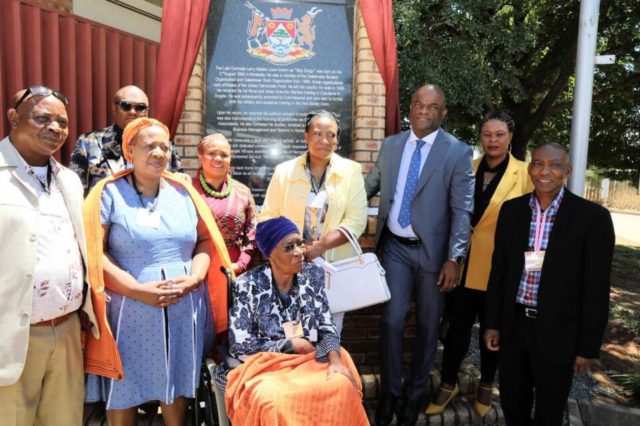“This name means nothing if this department is not able to provide houses to the people of the Northern Cape. Money that is given to the department must not be stolen, it must be used for the building of houses”
THE JS Du Plooy building in Kimberley, which houses the Northern Cape Department of Co-operative Governance, Human Settlement and Traditional Affairs (Coghsta), was yesterday renamed in honour of Larry Moleko Louw.
Louw, an MK underground operative who was trained in guerrilla warfare in Angola, was born in Kimberley on August 2, 1966.
He was a member of the Galeshewe Student Organisation and the Galeshewe Youth Organisation from 1985. These organisations were affiliates of the United Democratic Front.
Louw left the country in 1986, going into exile. He received his full rural and urban guerrilla warfare training in Caculama in Angola. He was subsequently promoted to commissariat and was sent to further both his military and academic training in the then Soviet Union.
The Premier of the Northern Cape, Dr Zamani Saul, together with the MEC for Coghsta, Bentley Vass, yesterday renamed the JS Du Plooy building, which is the provincial headquarters of Coghsta, the Larry Moleko Louw building.
In attendance was the Speaker of the Northern Cape Provincial Legislature, Newrene Klaaste, the provincial treasurer of the ANC, Fufe Makatong, and friends and family of the late Louw.
Addressing the attendees, Saul stressed the importance of Coghsta in honouring Louw’s name by delivering houses to the people of the Northern Cape.
“This name means nothing if this department is not able to provide houses to the people of the Northern Cape. Money that is given to the department must not be stolen, it must be used for the building of houses,” Saul said.
Vass, in his welcoming address, outlined the importance of the naming and renaming process.
“We are gathered here today on this momentous occasion to rewrite our public script. The naming and renaming process is an existential and political process. Existential in the sense that it asserts the identity of the people. Places and buildings are an outward manifestation of how people perceive themselves, both their history and value system,” Vass said.








